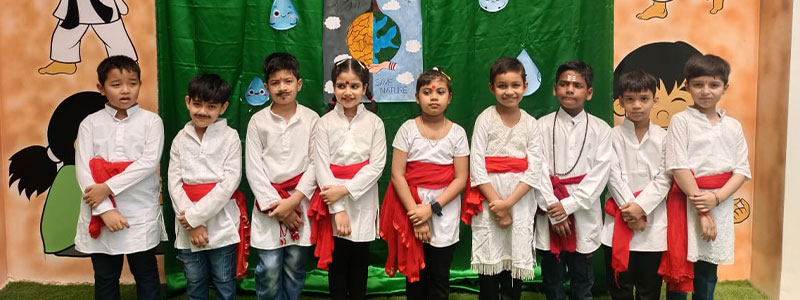- Call Us
- Mail Us
Welcome to Little Buds Montessori School, where every child’s journey begins with curiosity, creativity, and compassion. Nestled in the heart of Siliguri, for over 22 years, we have proudly embraced the renowned Montessori philosophy to cultivate a love for learning from the earliest years. We started with just 2 students and have now grown into a thriving community.
At Little Buds, we believe in nurturing the whole child – mind, body, and spirit – through hands-on exploration, personalized guidance, and a supportive community. Our commitment to quality education is reflected in our practice of maintaining a maximum of 20 students per class, ensuring each child receives individualized attention and support.
Our journey is dedicated to empowering young minds to blossom into confident, independent learners who are eager to explore the world around them. Join us at Little Buds Montessori School and discover the joy of learning in an environment where each child’s unique potential is celebrated and encouraged every day.

Dr. Maria Montessori's educational approach, known as the Montessori Philosophy, revolutionizes traditional learning by recognizing children as naturally eager, capable learners. Grounded in scientific observation and a deep understanding of child development, Montessori education emphasizes a child-centered environment where each student's unique interests, abilities, and learning styles are honored. The role of the Montessori educator transforms into that of a guide, providing individualized support and encouraging children to explore, discover, and construct their knowledge autonomously. This philosophy not only cultivates academic proficiency but also nurtures qualities like self-discipline, empathy, and a lifelong love of learning, laying a solid foundation for children to thrive in both academics and personal growth.
Montessori education is founded on several key principles that distinguish it from traditional educational approaches:
The focus is on the child's natural development and interests. Montessori classrooms are prepared environments where children can independently choose from a variety of activities that align with their developmental stage and interests.
Learning is experiential and tactile, with materials designed to be manipulated and explored by children. These materials are carefully chosen to facilitate understanding of abstract concepts through concrete experiences.
Children are encouraged to follow their intrinsic motivation and work at their own pace. This autonomy fosters independence, self-discipline, and a sense of responsibility for their learning.
Classes typically include a diverse age range, allowing younger children to learn from older peers and older children to reinforce their learning by helping younger ones. This arrangement promotes social skills, empathy, and collaboration.
Teachers observe each child closely to understand their unique learning style, strengths, and challenges. They then provide personalized guidance and support, adapting lessons and activities to meet the needs of each child.
Montessori educators deeply respect each child as an individual with their own pace of development and interests. They foster a nurturing and supportive environment where children are valued for who they are.
The classroom environment is meticulously prepared to promote independence, exploration, and discovery. It includes child-sized furniture, Montessori materials arranged on open shelves, and spaces designed for various activities like practical life, sensorial exploration, language, mathematics, and cultural subjects.
These principles collectively aim to cultivate not only academic skills but also essential life skills such as critical thinking, problem-solving, creativity, and social-emotional development, preparing children to become confident, adaptable, and lifelong learners.

Materials are meticulously designed to be self-correcting and encourage exploration and discovery. They are often made from natural materials such as wood, metal, and fabric, appealing to the senses and durable for repeated use.
Materials are typically organized sequentially, starting from simple to complex. This structure allows children to build upon their understanding gradually and at their own pace.
Materials are hands-on and sensory-rich, inviting children to engage actively in learning. For example, math materials include tangible objects like beads for counting and understanding mathematical concepts.
Each material isolates a specific concept or skill, allowing children to focus on mastering one aspect at a time without unnecessary distractions.
Children have the freedom to select materials that interest them and engage in activities independently, promoting autonomy and self-directed learning.
The classroom environment is carefully organized and aesthetically pleasing, with natural lighting, plants, and attractive, child-sized furniture. This orderliness supports concentration and a sense of calm.
Materials are arranged on low, open shelves within easy reach of children, encouraging independence as they select and return materials without adult assistance.
Classrooms often have children of different ages (e.g., 3-6 years in one classroom), which promotes social learning, cooperative play, and mentorship opportunities among peers.
While the environment allows for freedom of movement and choice, clear boundaries and ground rules ensure a respectful and harmonious learning community.
Spaces are designated for different learning areas, such as practical life activities (e.g., pouring, washing), sensorial exploration (e.g., sensory materials for size, color), language development (e.g., phonetic materials), mathematics (e.g., counting, operations), and cultural subjects (e.g., geography, science).
Montessori environments emphasize community-building, cooperation, and respect for others, fostering a sense of belonging and social responsibility among children.